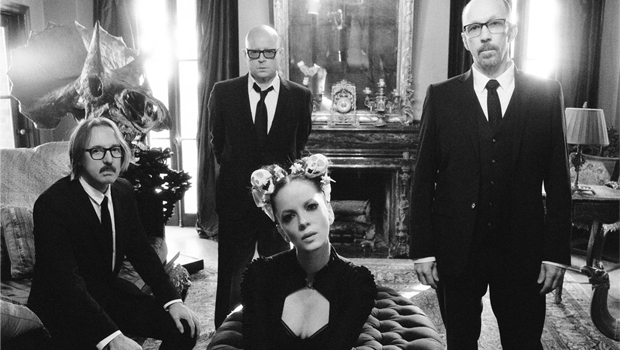
In 2008, Shirley Manson presented a handful of tracks to the big wigs at Geffen Records.
The songs — which she had been working on since roughly 2006, and were supposed to be part of her debut solo album — were immediately deemed "too noir." Not long after, Manson was free from her contract with Geffen.
"They wanted me to have international radio hits and 'be the Annie Lennox of my generation,'" she told Vanity Fair back in March. "I just thought, Fuck this."
Every bit of Manson's frustration seems to be channeled directly into Not Your Kind of People, the first new Garbage album in seven years.
Lacking the sonic bite of 1995's Garbage and 1998's Version 2.0 — two albums that were every bit the byproducts of the exploding worlds of alternative and industrial — Not Your Kind of People contains every bit of the vitriolic angst that fueled their earlier albums, albeit in a more subtle, diffuse manner.
Guitars are likewise harder to spot among synth-laden tracks like album opener "Automatic Systematic Habit" and debut single "Blood For Poppies." But that doesn't mean they're not there.
"There's a lot of guitar on there, just some of it doesn't sound like guitar," guitarist/bassist Duke Erikson assured me when we spoke on the phone recently, before admitting, "Some of the guitars are hard to spot."
Get The Pick Newsletter
All the latest guitar news, interviews, lessons, reviews, deals and more, direct to your inbox!
GUITAR WORLD: I guess the logical starting point is, how did this begin? How did you all get back on the horse, so to speak?
DUKE ERIKSON: We just sort of started talking on the phone a couple years ago about this and that. We hadn't really talked in five or six years — as a band, anyway. We would talk about doing one gig, then we'd talk about doing a few gigs, then maybe recording a couple of songs. Next thing you know, we're making a record.
How was your first experience getting back together? Was the plan to just go into a room and play?
Pretty much just like that. We picked a studio and we all agreed to just see how it felt and see if we could come up with anything good. We all walked into the lounge — I remember I was the last one there because I had been running a bit late. Everyone was sitting there and they all turned around and looked at me, and we all just started laughing. [Laughs] So that was kind of a good sign, I guess.
After a couple bottles of wine, we eventually went down, got everything set up and started playing. I think we came up with three or four pretty good song ideas out of it. It was a good omen, and we decided we would carry on and make a full-blown album. From there, we went to a smaller studio in Atwater Village and worked, huddled around our Pro Tools.
Do you remember which songs on the album came out of that initial jam session?
"Battle In Me" is one. That's probably the standout one. That's one that we're doing live as well, partly because it came out of the four of us setting up and playing together. It feels natural to do that.
It's funny you say that, because that track probably stands out most to me as "vintage" Garbage song. That said, you'd be hard-pressed to call this record guitar-heavy, especially in the context of some of your earlier albums. How did the sound of this album evolve?
Well, the first time we got together we just set up with guitars, some keyboards and drums — with me and Steve [Marker] switching off on bass — just mucking around and Shirley just free forming. That was the testing ground to see how it all felt, both personally and musically. We started throwing ideas into the pot and a lot of them were songs like "Automatic Systematic Habit," which is more synth-based than guitar-based. Once we started on the album proper, it became a Garbage record, which is any number of approaches to writing a recording. There were no rules, certainly.
Some of the guitars are hard to spot. "Big Bright World," for example, is basically a guitar song, but, in the way we have, we decided to muck around with it and change things up. But there's a lot guitar on there, it just sounds like a synth.
As you mention, you and Steve trade off guitar and bass duties. How do you go about divvying up the parts? Does it usually come down to who wrote what?
Pretty much. Whoever comes up with what at any given time. There's no job description as far as lead guitar/rhythm guitar. It's just whoever has an idea as a articular moment. It's usually about 50/50, whether the idea is any good or not. [Laughs] But that's how we do it. There's no one way it's done. It's all rather confusing, really. [Laughs]
Did all of the songwriting for Not Your Kind of People happen like that initial session, where you were all in a room, or did you write from home any and send tracks back and forth?
Exactly like that. We were in a room together and then we'd all go home and send ideas in. Butch, Steve and I all have a little home studio so we can send in files and have them placed in the song to see how it works. Some of that stuff is on the record as well; some of the home stuff we did is in there. Anything in between all of that, really.
Shirley wrote the bulk of the lyrics, but everyone contributed. She would often ask us for ideas for lyrics. One of us would toss out a line and she would either go, "Are you kidding? That's awful," or she would say, "I'm gonna put that right here" and fit it into the song. It was a very do-it-yourself, homemade thing when it comes down to it. We all pitch in. Shirley had just as many comments on the guitar parts or the sound of the guitars as anybody else, and likewise, if we don't like a lyric, we say it right away.
Considering how long the band had been on break, did you start completely fresh with new material or did you all have some ideas stashed away for when the band got back together?
There were a few things.
One of the bonus tracks on the digital release, "show me," is quite old and turned out to be really nice. It didn't quite get done in time to be on the album, but we got it finished up in time for the bonus tracks. It's quite old ... god, 10 years old or something. There's always ideas. There are so many ideas floating around that it's hard to tell where they came from — how old they are, how new they are.
It sounds like there are a lot of different guitars on this album. What were your primary guitars?
We had a vast array of guitars. I played probably a Tele and — god, what did I play more than anything? I played a really nice Gretsch.
You know, there were no particular guitars. Everything from Strats to Teles to old Les Pauls to Les Paul Jrs. Billy, my guitar tech — it was actually his studio we were working in — has a huge collection of guitars. You should be talking to him. [Laughs]
Whatever sound we heard in our heads or thought we were looking for we would walk into his studio and just scan the walls. There were a dozen or so guitars hanging there, and you'd just sort of point at that one and give it a try. He had just as many amplifier options, as well.
You mentioned earlier how a lot of the guitar sounds on the album don't really sound like guitars. How extensive was your pedalboard for this album?
Once again, there was a couple racks of old and new pedals — some pedals I had never even heard of before. We just at-random sometimes grabbed one just to see what it would do.
I don't remember the song — "Sugar" maybe, I can't remember — where I wanted something random. I didn't want a pattern, I wanted something distorted and random that would break up. I think that's how I described it to Billy. He had no idea what I was talking about, of course. [Laughs]
And we started mucking about and he just plugged one in and it started crackling to where you could barely hear the notes. It was just this random distortion, in-and-out kind of break up sound. I said, "Wow, that sounds amazing." And he said, "Yeah, the battery's almost dead." [Laughs] But we used it.
This album is being released on your own record label. How are you enjoying the freedom that comes with that?
Well, it's awesome. But freedom brings about responsibilities. [Laughs] We are all of a sudden responsible for a lot of things we weren't really thinking about all that much. But it's great to be in control of it. I think we eventually didn't bother to think about it, because we didn't think there was anything we could do about it. But now it's kind of up to us what moves we make and how things are done.
We're glad to have that responsibility, and we're very happy to be free of that burden.
Not Your Kind of People, the first new Garbage album in seven years, is out now on STUNVOLUME. You can pick it up on iTunes here.
Josh Hart is a former web producer and staff writer for Guitar World and Guitar Aficionado magazines (2010–2012). He has since pursued writing fiction under various pseudonyms while exploring the technical underpinnings of journalism, now serving as a senior software engineer for The Seattle Times.
“You’ve gotta lose the fuss. You grab the new guitar, you scratch it. Grab the key right away": Kiko Loureiro on why players shouldn’t be too precious about their guitars
“It was the first and last time I've ever argued with Brian May. He was so adamant about us not doing it”: Nuno Bettencourt recalls Extreme’s rebellious Queen medley at the Freddie Mercury Tribute Concert








![[from left] George Harrison with his Gretsch Country Gentleman, Norman Harris of Norman's Rare Guitars holds a gold-top Les Paul, John Fogerty with his legendary 1969 Rickenbacker](https://cdn.mos.cms.futurecdn.net/TuH3nuhn9etqjdn5sy4ntW.jpg)


